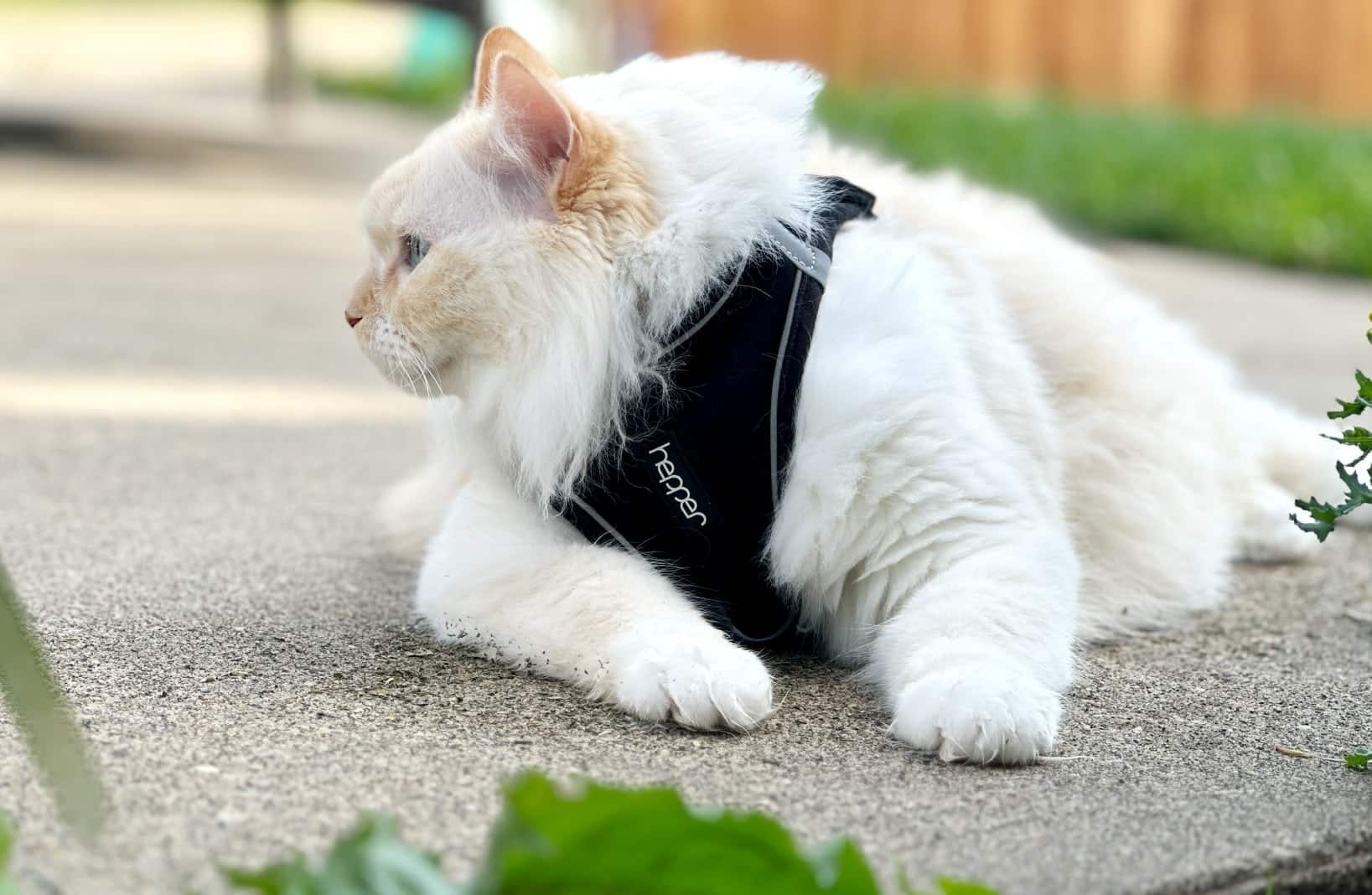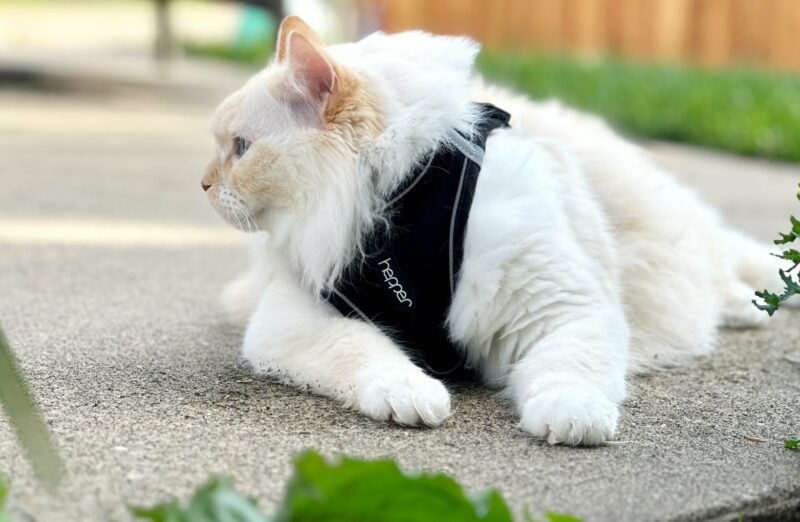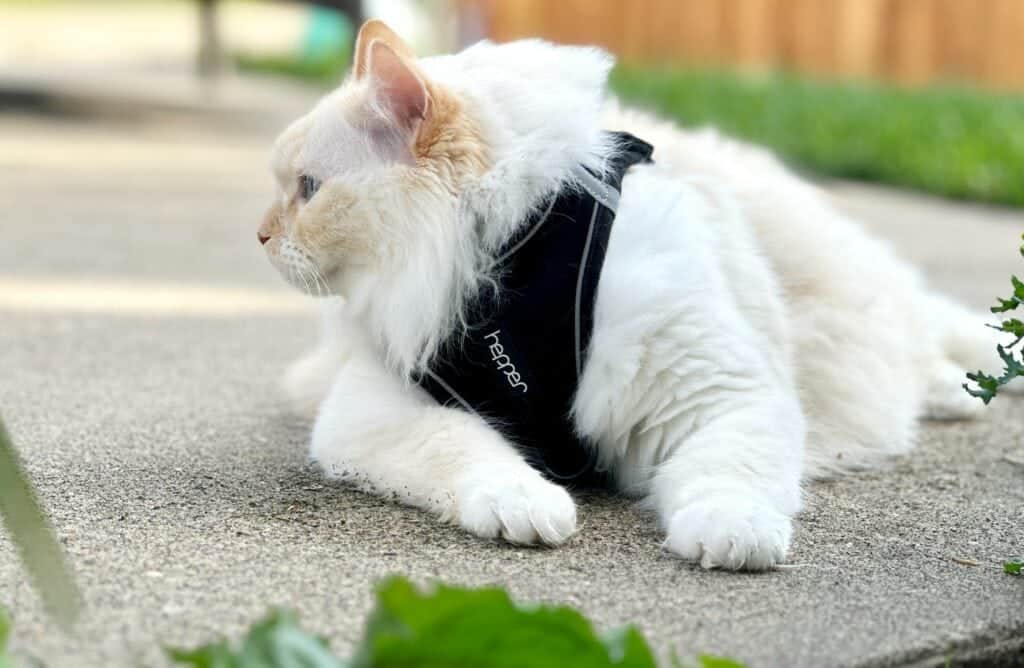
With regular use, cats often learn to escape their traditional harnesses. This can be incredibly dangerous on night walks in high-traffic areas. Luckily, our top 10 picks are 100% escape-proof, so you can enjoy a safe and stress-free walk with your pet.
We evaluated each option for durable materials, security features, and other factors to rank our top picks. Our detailed reviews will guide you through each harness’s features, pros, and cons, making the decision-making process a breeze.
Keep reading to find the perfect harness that combines security, comfort, and style.

A Quick Look at Our Winners in 2024
| Image | Product | Details | ||
|---|---|---|---|---|
| Best Overall |
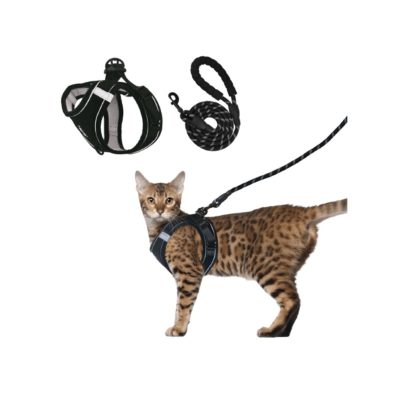
|
Hepper Cat Harness & Leash Set |
|
CHECK PRICE |
| Budget Buy |

|
PetSafe Come With Me Kitty Nylon Cat Harness & Bungee Leash |
|
CHECK PRICE |

|
WALKABOUT Original Back End Harness |
|
CHECK PRICE | |

|
Rabbitgoo Cat Harness & Leash for Walking |
|
CHECK PRICE | |

|
Supet Cat Harness & Leash Set |
|
CHECK PRICE |
The 10 Best Escape-Proof Cat Harnesses
1. Hepper Cat Harness & Leash Set – Best Overall
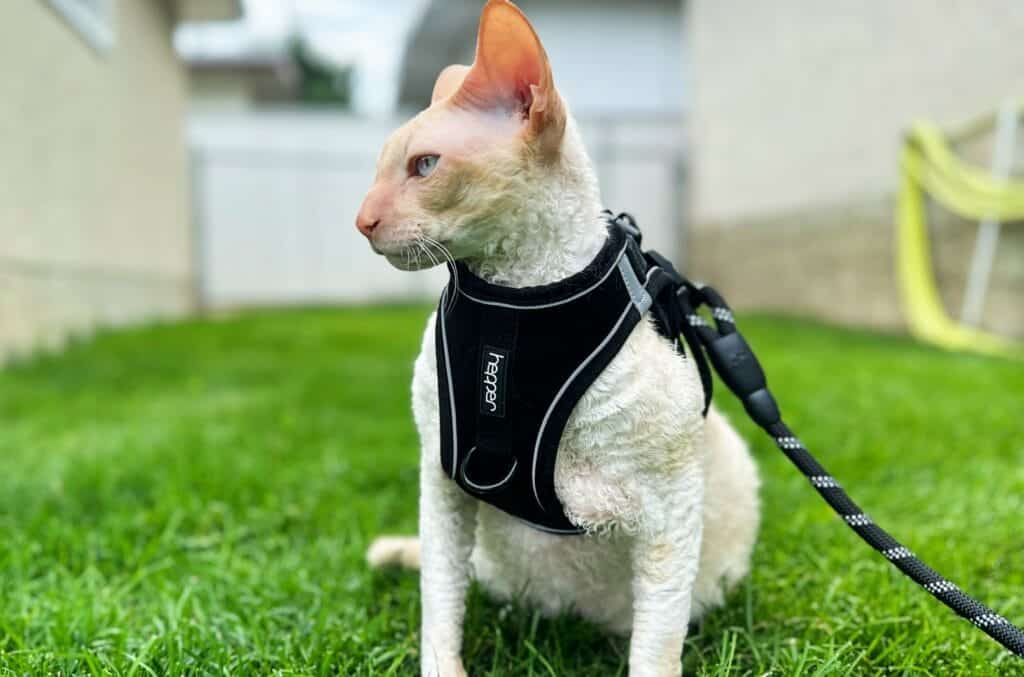
| Sizes: | XXS, XS, S, M, L, XL |
| Harness Type: | Vest-style harness |
| Closure Type: | Buckles |
| Leash Included: | Yes |
| Reflective: | Yes |
The Hepper Cat Harness and Leash Set is the choice for the best overall escape-proof cat harness. Crafted with extra attention to detail, this set offers unbeatable quality and functionality. Its construction consists of durable materials and strong stitching, ensuring escape-proof security.
Plus, its adjustable straps guarantee a comfortable fit for your feline friend. With a versatile “H” or “X” shape design, slipping out is virtually impossible. The set also includes a matching leash for convenient walks.
The Hepper Cat Harness and Leash Set guarantees peace of mind and comfort for you and your cat on your daily walks. The only downside is that there is only one color to choose from so far.
At Catster, we’ve admired Hepper for many years and decided to take a controlling ownership interest, so that we could benefit from the outstanding designs of this cool cat company!
- Secure vest-style design
- Adjustable buckles for a better fit
- Reflective strips for increased visibility
- Includes a matching leash
- Available in different sizes
- Only comes in one color
2. PetSafe Come With Me Kitty Nylon Cat Harness & Bungee Leash – Budget Buy

| Sizes: | S, M, L |
| Harness Type: | Vest-style harness |
| Closure Type: | Snap closure |
| Leash Included: | Yes |
| Reflective: | Yes |
The PetSafe Come With Me Kitty Nylon Cat Harness & Bungee Leash is ideal for those on a budget.
Its nylon construction ensures durability and style at the same time. Plus, the bungee leash provides flexibility and shock absorption. Unlike other harnesses, its bungee design prevents tugging by “giving” when your cat reaches the end of the leash.
Your cat will feel at ease during walks with its soft and comfortable fit. The dual adjustment points allow a customized fit, ensuring an escape-proof experience. This harness also offers reliable control and prevents choking or discomfort.
The best part? It doesn’t ask you to compromise on quality or break the bank. Choose the PetSafe Come With Me Kitty for the best value in an escape-proof cat harness.
- Bungee leash reduces pulling
- Affordable and offers excellent value for money
- Flexible and adjustable
- Made from comfortable nylon material
- Somewhat thin and flimsy
- Limited size options
3. WALKABOUT Original Back End Harness

| Sizes: | XS, S, M, M-L, L, XL |
| Harness Type: | Back-end harness |
| Closure Type: | Buckles |
| Leash Included: | No |
| Reflective: | No |
If you’re willing to splurge for your cat, the WALKABOUT Original Back End Harness may be your premium choice. There’s no doubt that it’s on the pricier side, but it’s a worthwhile investment. You can count on this harness to provide your money’s worth with its durability and features.
Designed for maximum functionality, this harness offers unparalleled support and control. That’s exactly why it’s ideal for cats with mobility issues. Its unique back-end design provides extra stability and ensures a comfortable fit.
Its durable materials and strong closures also guarantee security and peace of mind. If your cat is recovering from knee, hip, or back injuries, the harness can help provide the needed support. It also helps manage arthritis or other mobility issues.
- Helps manage arthritis or other mobility issues
- Ideal for cats recovering from knee, hip, or back injuries
- Helpful for senior cats
- High-quality and durable construction
- Leash not included
- No reflective elements
- Expensive
4. Rabbitgoo Cat Harness & Leash for Walking

| Sizes: | XS, S |
| Harness Type: | Step-in vest |
| Closure Type: | Buckles |
| Leash Included: | Yes |
| Reflective: | Yes |
Finding a well-fitted harness for your kitten can be tricky due to its small size. Luckily, the rabbitgoo Cat Harness and Leash for Walking is designed with growing kittens in mind. It provides the perfect balance of comfort, adjustability, and safety.
Its adjustable straps ensure a snug fit for growing kittens. Meanwhile, the breathable and lightweight material keeps them cool and comfortable during walks. The harness features reflective strips, keeping your kitten safe in low-light conditions.
With a secure closure and sturdy D-ring for leash attachment, you can have peace of mind knowing your kitten is safe. Most importantly, the step-in vest design makes it a breeze to put on. However, it is a bit pricey.
- Suitable for growing kittens
- Metal D-ring
- Includes Velcro fastenings
- Available in multiple colors and patterns
- Somewhat expensive
5. Supet Cat Harness & Leash Set
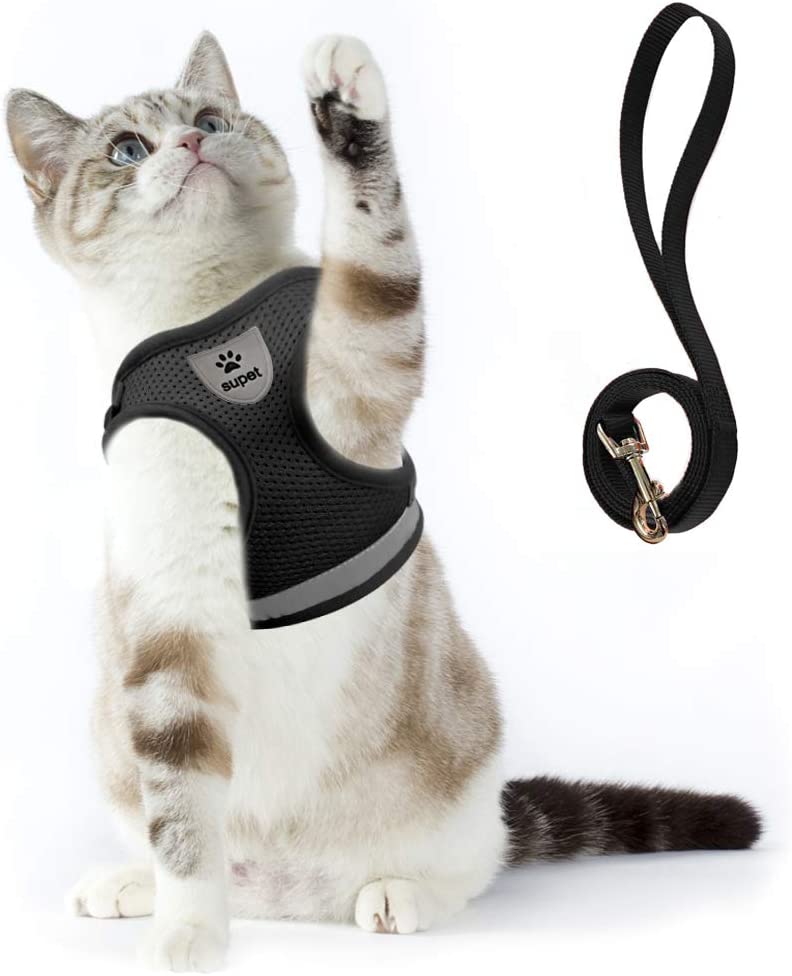
| Sizes: | S, M, L |
| Harness Type: | Step-in harness |
| Closure Type: | Buckles |
| Leash Included: | Yes |
| Reflective: | Yes |
The Supet Cat Harness and Leash Set is the perfect choice for cat owners looking for a step-in harness. Traditional harnesses are often stressful for your cat to put on. But this innovative step-in design makes putting it on and taking it off effortless.
The adjustable straps ensure a snug, secure, and comfortable fit. Meanwhile, the reflective elements provide added visibility during walks. Crafted with your cat’s comfort in mind, it’s made from a breathable material that won’t restrict their movements.
The sturdy D-ring allows easy leash attachment, giving you control during outdoor adventures. The best part is that it sits on your cat’s shoulders instead of its neck, reducing discomfort.
- Easy to put on and fit
- Sits on the shoulders instead of the neck
- Allows good range of motion
- Durable construction
- Too bulky for some cats
- Runs small
6. Pidan Cat Harness & Leash Set

| Sizes: | One size |
| Harness Type: | Vest-style harness |
| Closure Type: | Buckles |
| Leash Included: | Yes |
| Reflective: | Yes |
The Pidan Cat Harness and Leash Set For Walking is a great choice for those in search of the best leash and harness set. This set offers a perfect combination of style, functionality, and comfort. The harness features adjustable straps, creating a secure fit for your cat.
The durable leash ensures reliable control during walks. Meanwhile, the vibrant and multicolored design adds a touch of personality. Overall, the Pidan Cat Harness and Leash Set guarantees durability and long-lasting performance.
Its ease of use makes it the perfect pick for beginners with no harness experience. Still, you must note that this harness and leash set only comes in one size. So, it may not be suitable for cats over 12 pounds.
- Good for beginners
- Easy to take on and off
- Lightweight and minimalistic
- Comfortable for the cat
- Too small for cats over 12 pounds
- Only comes in one size
7. Travel Cat Reflective Cat Harness & Leash Set
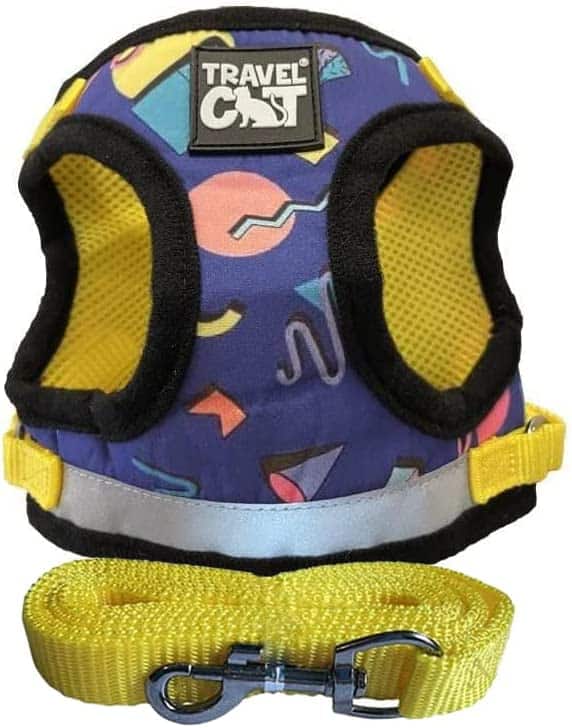
| Sizes: | XS, S, M, L |
| Harness Type: | Vest-style harness |
| Closure Type: | Buckles |
| Leash Included: | Yes |
| Reflective: | Yes |
If your cat likes tagging along on your travel adventures, a traditional harness won’t do. You need a Travel Cat Reflective Cat Harness and Leash Set! Its vest design, buckle closure, and security features make it ideal for energetic trips across the world.
The harness is lightweight and comfortable, allowing your cat a good range of motion. Its reflective strips enhance visibility during outdoor adventures, ensuring safety in low-light conditions. The adjustable straps and durable leash provides reliable control.
Crafted with high-quality materials, this harness and leash set is built to withstand the rigors of travel. Still, some may find the padding and coverage excessive, limiting the cat’s range of motion. It’s also worth noting that this set is only suitable for kittens.
- Nylon webbing leash included
- Allows good range of motion
- Durable construction
- Reflective strips
- Too much padding and coverage
- Only for kittens
8. Voyager Step-In Air Dog Harness

| Sizes: | XXXS, XXS, XS, S, M, M-L, L, XL |
| Harness Type: | Step-in design |
| Closure Type: | Velcro |
| Leash Included: | No |
| Reflective: | No |
Finding a well-suited harness is trickier when your cat is larger than most. If your cat is over 12 pounds, the Voyager Step-In Air Dog Harness may be the best fit. This harness is designed to accommodate larger sizes, so your big cat doesn’t have to miss out on its daily walks.
The step-in design eliminates the hassle of wriggling your cat into the harness. Crafted with breathable mesh fabric, it provides ventilation and prevents overheating during walks. The adjustable straps ensure a snug fit, while the durable hardware ensures long-lasting use.
With its reliable control and comfort, this is the best choice for big cats who need a harness to handle their size.
- Good range of motion
- Breathable and comfortable
- Lightweight and minimalistic
- Easy to put on
- Available in many sizes
- Plastic buckle could be more durable
- Leash not included
- No reflective elements
9. Kitty Holster Cat Harness
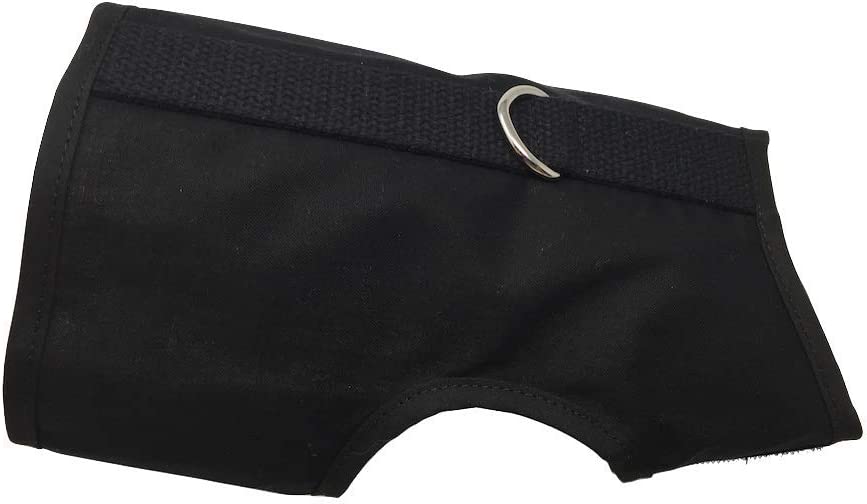
| Sizes: | XS, S, M, M-L, L, XL |
| Harness Type: | Vest-style harness |
| Closure Type: | Hook and loop |
| Leash Included: | No |
| Reflective: | No |
When choosing an escape-proof cat harness, you must prioritize your cat’s comfort. In efforts to enhance security, some harnesses are restrictive and uncomfortable. But that’s not the case with the Kitty Holster Cat Harness.
This harness is designed with your cat’s comfort in mind. It features a soft and lightweight material that won’t cause discomfort or irritation. The breathable fabric allows for proper airflow, keeping your cat cool during walks.
Its unique vest-style design evenly distributes pressure, preventing strain on the neck. With adjustable straps and secure closures, you can ensure a perfect fit for your cat’s size and shape. This harness provides unparalleled comfort, allowing your cat to enjoy its outdoor adventures. However, it is a bit strange that the hook-and-loop feature is on the stomach area. Plus, it doesn’t come with a leash and isn’t reflective.
- 100% breathable cotton
- Lightweight
- Comes with a pamphlet on how to train leash walking
- Long hair may get stuck in the hook-and-loop
- Hook-and-loop adjustment is on the cat’s tummy
- Leash not included
- No reflective elements
10. Dooradar Cat Harness & Leash Set

| Sizes: | XS, S |
| Harness Type: | Vest-style harness |
| Closure Type: | Buckles |
| Leash Included: | Yes |
| Reflective: | Yes |
When it comes to adjustability, the Dooradar Cat Harness and Leash Set take the lead as the best option. This harness focuses on providing a perfect fit for cats of all sizes. You can customize the harness with adjustable straps to suit your cat’s unique body shape.
But there’s more to this harness than its adjustability. Unlike many harnesses, it reduces pressure from the throat by placing the strap on the cat’s shoulders. It’s also stain-resistant, making clean-up a breeze.
Its sturdy D-ring allows for easy leash attachment, giving you full control. With this set, you can enjoy peace of mind knowing your cat has a harness that adjusts to its needs. Still, remember that its front rubber grip may slip down while walking.
- Pressure on the shoulders, not the throat
- Stain resistant
- Harness and leash set
- Lightweight and minimalistic
- The front rubber grip can slip down
- Only suitable for kittens

Buyer’s Guide: Choosing the Best Escape-Proof Cat Harness
Here’s a complete buyer’s guide for escape-proof cat harnesses. From durable materials to comfort levels, you must consider essential features like reflective stitching and step-in designs.
Material
When it comes to the material of an escape-proof cat harness, durability is key. Look for high-quality materials such as nylon or polyester webbing. These materials are well-known for their durability and resistance to wear and tear.
You must also ensure the harness has strong stitching throughout. Double or reinforced stitching is extra durable, adding another layer of security. Inspect the seams and edges of the harness to ensure they are secure and won’t fray or unravel with regular use.
The hardware of the harness is also important. Make sure the buckles, D-rings, and other attachments are metal or heavy-duty plastic. Avoid options with flimsy or low-quality hardware.
You may also find harnesses with added durability features. For example, some models have metal rings or clips sewn into the fabric for extra reinforcement. These features can help prevent your cat from damaging the harness to escape.
Design
When choosing a cat harness, the design and fit are crucial factors to consider. The right design ensures that the harness fits your cat’s body and minimizes escape risk.
Look for a harness with an “H” or “X” shape design. These designs distribute pressure evenly across the chest and shoulders. This provides better control and reduces the chances of your cat slipping out of the harness.
To find the right size harness, measure your cat’s girth around its chest and behind the front legs. Refer to the manufacturer’s size chart to determine the appropriate size for your cat.
The harness also should fit securely without being too tight or restrictive. You should be able to fit at least two fingers between the harness set and your cat’s body to ensure a comfortable fit. Avoid harnesses that are too loose, as your cat may be able to wriggle out of them.
Lastly, cats come in many different shapes, and some harness designs may suit certain body types better than others. For example, cats with slim or narrow chests may fit a harness with adjustable straps.
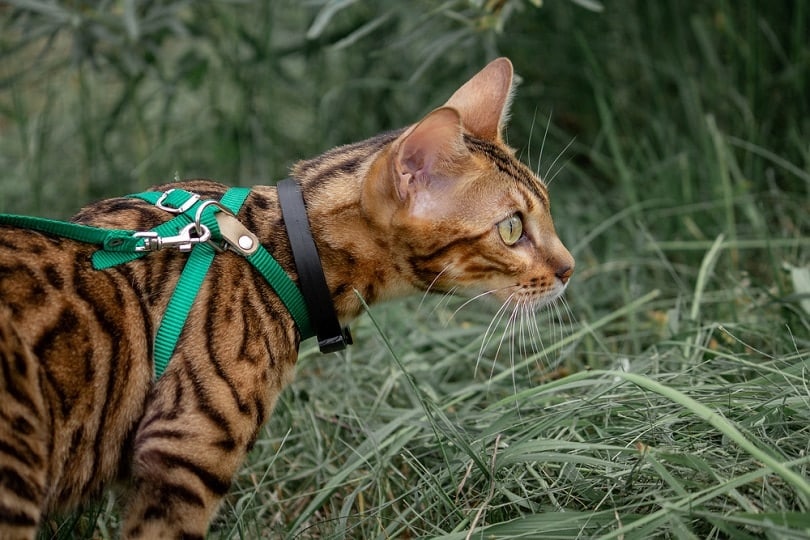
Leash Attachment
The leash attachment point is a crucial aspect of an escape-proof cat harness. It should be strong and able to handle pulling and sudden movements.
Look for a harness with a sturdy D-ring or metal loop designed for leash attachment. These attachment points should be made of durable materials. Metal or heavy-duty plastic can withstand the tension created by your cat’s movements.
Also, ensure the leash attachment point is securely reinforced to the harness. The stitching should be strong and able to withstand pulling without coming apart. Added layers of fabric or webbing can also prevent the attachment point from tearing.
The leash attachment point should be positioned for optimal control during walks. It should be on the upper back of the harness, near the shoulder blades. This placement helps prevent your cat from pulling or slipping out of the harness.
You must also ensure the attachment point is compatible with standard leash hardware. It should accommodate various leashes, like those with clasps, clips, or carabiners. More importantly, it should be easy to detach and attach.
Consider the weight-bearing capacity of the leash attachment point. It should be able to handle the weight and force exerted by your cat without bending or breaking. This is especially important for larger or more active cats who may pull on the leash with more strength.
Escape-Proof Features
Opt for a harness that incorporates double closures, such as buckles and Velcro. This dual-closure system provides an extra layer of security, reducing the chances of your cat slipping out of the harness. The buckles ensure a secure fit, while the Velcro provides more reinforcement.
Some escape-proof harnesses feature extra padding around the chest and neck areas. This padding serves two purposes. First, it adds comfort for your cat, reducing the risk of chafing or discomfort. Second, the extra padding creates a snugger fit, preventing your cat from escaping.
Also, look for harnesses with wider straps, especially around the chest and neck areas. Wider straps distribute pressure evenly and provide a more secure fit. Narrow straps may be easier for your cat to manipulate or slip out of.
Some harnesses also feature special escape-proof buckles. These buckles need two separate actions to release, making it difficult for your cat to open them. This feature adds another layer of security, particularly for cats who can escape traditional buckles.
Check that the harness has reinforced stitching in critical areas. That includes the attachment points and strap connections. This ensures that the harness remains intact despite your cat’s movements.
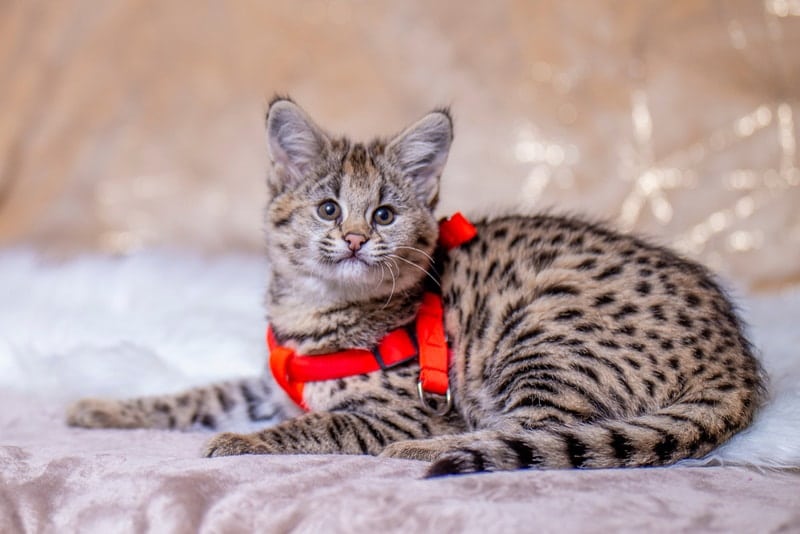
Comfort
When choosing an escape-proof cat harness, the comfort and safety of your cat should be a top priority.
Look for a harness that features soft padding or a mesh lining on areas in direct contact with your cat’s skin. This helps prevent chafing and irritation. The soft padding also adds extra cushioning, making it more comfortable.
The harness should also allow for a full range of motion. Avoid harnesses that cover too much of your cat’s body or have straps that impede their natural gait. A well-designed harness will allow your cat to walk, run, and climb comfortably.
Ensure that the harness distributes pressure evenly across your cat’s body. It shouldn’t put too much force on specific areas, such as the neck or chest. Look for harnesses with wide, adjustable straps that help distribute pressure better.
Choosing the right size harness is crucial for your cat’s comfort and safety. An ill-fitting harness can cause discomfort and allow your cat to escape. Refer to the manufacturer’s sizing guidelines and precisely measure your cat’s girth.
Reflective or Visibility Features
If you take your cat for walks at night, consider visibility and safety features for low-light conditions. Look for a harness that incorporates reflective stitching into its design. Reflective materials can make your cat more visible in dim lighting or at night. Harnesses with reflective stitching keep them safe during night walks or in low visibility.
If your cat wears a collar or ID tags, consider a harness that includes attachment points for these items. This allows you to keep their identification visible even while wearing the harness.
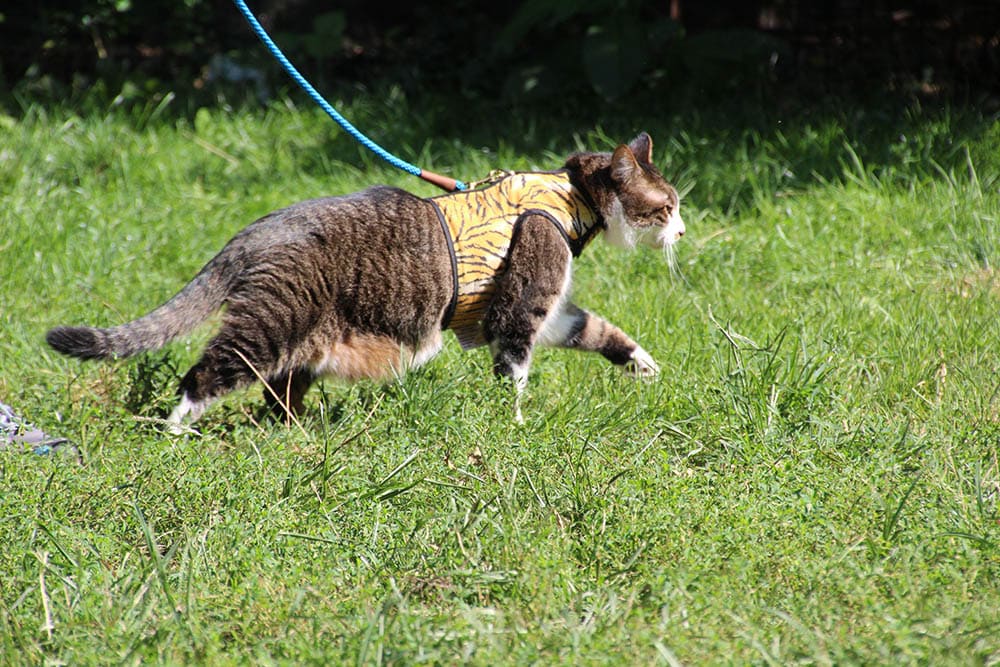
Ease of Use
Ease of use is another important factor to consider. Look for harnesses with a step-in design, allowing your cat to step into the harness easily. This design eliminates the need to put the harness over your cat’s head.
Most cats find the traditional design uncomfortable or stressful. A step-in harness has two leg openings and an adjustable strap around the cat’s chest or back. This makes it simpler to secure the harness in place.
Harnesses with quick-release buckles also provide a simple way to fasten and unfasten the harness. These buckles allow you to secure or release the harness with one hand. Quick-release buckles are helpful if your cat is impatient or tends to wriggle while you put it on.
Harnesses with adjustable straps offer flexibility in achieving the perfect fit. These straps can adjust your cat’s body size and shape. The ability to customize the fit ensures both comfort and security, making it easy to put it on and take it off.
Lastly, look for harnesses with clear and concise instructions on how to use them. Some manufacturers may provide written instructions, illustrations, or even video tutorials. Clear instructions reduce any stress or confusion during the harnessing process.

Conclusion
When it comes to escape-proof cat harnesses, thorough reviews help guide your decision.
After careful evaluation, there’s no doubt that the Hepper Cat Harness and Leash Set is the best overall pick. It combines durability, adjustable straps, and reflective features.
For those on a budget, the PetSafe Come With Me Kitty Nylon Cat Harness & Bungee Leash offers a comfortable design and affordable price. Meanwhile, the WALKABOUT Original Back End Harness prioritizes support and control for cats with mobility issues.
- Related Read: Best Cat Strollers
Featured Image Credit: Goldeneden, Shutterstock
Contents
- A Quick Look at Our Winners in 2024
- The 10 Best Escape-Proof Cat Harnesses
- 1. Hepper Cat Harness & Leash Set – Best Overall
- 2. PetSafe Come With Me Kitty Nylon Cat Harness & Bungee Leash – Budget Buy
- 3. WALKABOUT Original Back End Harness
- 4. Rabbitgoo Cat Harness & Leash for Walking
- 5. Supet Cat Harness & Leash Set
- 6. Pidan Cat Harness & Leash Set
- 7. Travel Cat Reflective Cat Harness & Leash Set
- 8. Voyager Step-In Air Dog Harness
- 9. Kitty Holster Cat Harness
- 10. Dooradar Cat Harness & Leash Set
- Buyer’s Guide: Choosing the Best Escape-Proof Cat Harness
- Material
- Design
- Leash Attachment
- Escape-Proof Features
- Comfort
- Reflective or Visibility Features
- Ease of Use
- Conclusion

